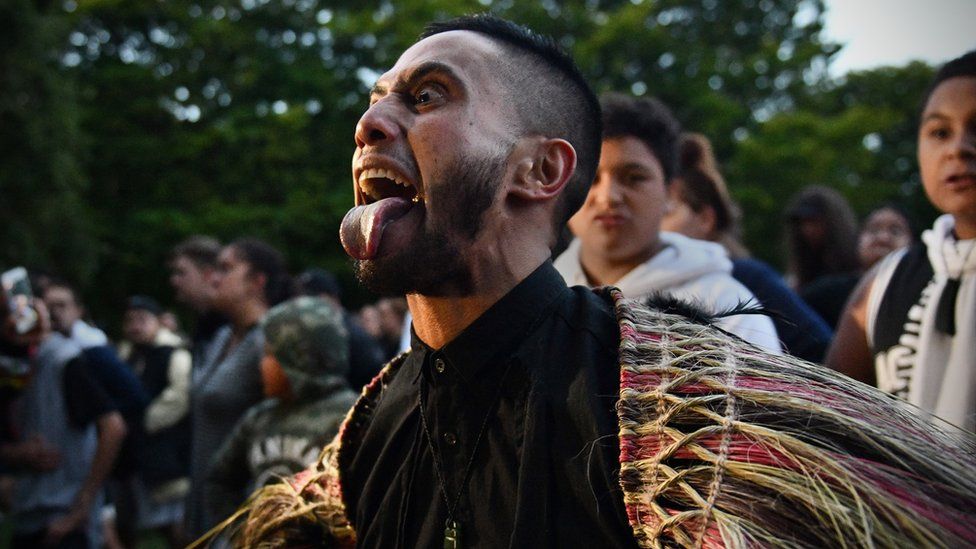Christchurch shootings: How Maori haka unify New Zealand in mourning
- Published

As New Zealand mourns the victims of the Christchurch mosque shootings, traditional Maori haka dances are reverberating around the country.
It's a type of ceremonial dance many might associate with the famous New Zealand All Blacks rugby team.
But what does a haka actually signify, and why have so many been performed across New Zealand this week?
What is a haka?
Haka means "dance" in the language of New Zealand's Maori people. It's a group performance involving synchronised movements, lots of stomping, shouting, and eye-rolling.
In fact, there isn't just one haka - there are hundreds and new ones continue to be composed. Each region and each tribe has its own versions, depending on the occasion and who taught dance to the community.
Matthew Tukaki, executive director of the Maori Council of New Zealand, told the BBC that while it's often thought of as a war dance, "the central theme is actually one of respect".
So is it actually a war dance?
"Traditionally it was a war dance to basically threaten or warn the enemy," explains Mr Tukaki. "But its meaning has changed."
You'll have seen the All Blacks doing a haka on going into competition, but you might also remember another haka being performed whenever the British royals pay a visit to New Zealand.
Today, different haka are performed at all kinds of ceremonial occasions - from receiving dignitaries to birthdays, weddings, anniversaries, or the funerals of chiefs and people of high standing. The words used can change with the purpose.
Why are haka performed for the Christchurch victims?
There have been countless spontaneous instances where New Zealanders have performed a haka in recent days.
"I am not all surprised to see this," says Donna Hall, a fellow member of the Maori council. "It's a spiritual response to what has happened and it really is intended to tap the spiritual depth of people."
She points out that it's very important for the country to have this "unifying response" right now, at a time when everyone is still shocked by what happened last Friday.
Christchurch shootings: Flowers and Haka
Does every Kiwi know how to dance a haka?
Pretty much. Traditionally, the practice had been limited to Maori communities, but it has long spread far beyond that.
"Let's be honest, the All Blacks can take most of the credit for this," says Ms Hall.
Today, most children learn different haka in school from early on, regardless of whether they are Maori or not.
What about cultural appropriation?
Is it ok for non-Maori New Zealanders to perform a haka? "Yes," Mr Tukaki says emphatically. "This is a special time. We are at a special moment in New Zealand history, but also one that will be important for our future."
Cultural appropriation would only be an issue when cultural elements are adopted outside the communities, he says, without any Maori involvement. This is not the case in the current situation.
Christchurch students perform Haka for shooting victims
Mr Tukaki believes the many haka videos going viral are a powerful statement in themselves, countering the online hatred that allegedly fed the shooting suspect's thinking.
"Let's overwhelm them with love," he says. "I've seen haka from New Zealand, but also from Chicago, New York, London and Sydney. I have seen boys from a Muslim school in Auckland doing it - and it makes me very proud."
What happened on Friday?
The New Zealand Maori Council had called for a nationwide haka on 22 March, the day that commemorations marked one week since the shooting.
In many places across the country, people came out to mark the day with the ceremonial dance.
Allow Twitter content?
This article contains content provided by Twitter. We ask for your permission before anything is loaded, as they may be using cookies and other technologies. You may want to read Twitter’s cookie policy, external and privacy policy, external before accepting. To view this content choose ‘accept and continue’.
A special haka planned to take place at the Al-Noor mosque did not go ahead, however - overtaken by the main commemorations at the site where most of last week's victims died.
"While there will be many different haka on Friday, there will be one common theme," Ms Hall explained ahead of the day.
"We will be taking a stand against hatred, showing love and compassion for our Muslim community."
The haka composed for the Christchurch commemoration
Here are the words to the haka specially commissioned by the Maori Council to commemorate the victims of the Christchurch shooting.
Haka Koiora - Haka for life
Paiahahā, Paiahahā (Attention! Attention!)
He aha rā ka tāpaea ngā mahi kikino (Why do we wait for something bad to happen)
Ki te kūkūtia tātou katoa e? (To eventually come together?)
Ia ha ha!
E oho, kia tika rā (Wake up, be true!)
Unuhia ngā here o te kino, (Strip away bad things like)
Whakatakē, whakaparahako e (Negativity and belittling others)
Ko te pūtake o te whakaaro, he kaikir (because the underlining factor is racism)
Takatakahia Hi (Stomp on it)
Wherawherahia Hi (Get rid of it)
Kia tū te tangata koia anake (So all that remains is your true person)
Ko au, Ko koe, ko koe, ko au, ko tāua e (I am you, you are me, this is us)
Ko te mea nui o te ao (The greatest thing in this world)
He tangata, He Tangata, He Tangata e ('Tis people, 'Tis people, 'Tis people)
Hi!
Composed by Dr Ken Kennedy, Koro Tini and Jamus Webster
- Published21 March 2019
- Published18 March 2019
- Published17 March 2019
- Published21 August 2020